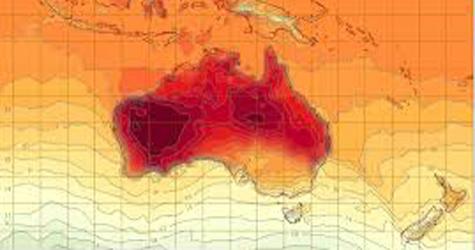A doctors group, Doctors for the Environment Australia (DEA), is warning of the dangers of extreme heat as scorching temperatures continue to affect many areas of Australia.
Temperatures across widespread areas of south-east Australia are expected to reach a searing 40°C for much of this week.
"Extreme heat is a major threat to health and places significant strain on our health system,” Dr Eugenie Kayak said. "It is associated with increased risk of heart attacks, heat stroke and death.”
She said that he 2009 heat wave, preceding Black Saturday, was associated with 374 excess deaths in Victoria.
“The elderly, the very young and those with pre-existing medical conditions are most vulnerable as well as those who are socially isolated or more exposed to extreme heat - the homeless and outdoor workers,” she said.
Often referred to as a 'silent killer' heat waves are responsible for more deaths than any other type of extreme weather event in Australia.
"It is important that people take measures to ensure they are safe by staying cool, well hydrated and in contact with others," she said.
Australia has experienced an extremely hot start to 2014 with heat waves affecting large parts of the country, on the back of 2013 being the hottest year on record.
"Climate change is impacting our health now. An increasingly hot climate with more severe extreme weather events is the reality we face unless we take decisive action to reduce our fossil fuel emissions both domestically and through exports.
"This week is a timely reminder that human health is fundamentally dependent on a stable climate and healthy environment and both should be public health priorities," Dr Kayak said.
Tips to reduce-heat related illness
- Drink plenty of water, even if you do not feel thirsty (if your doctor normally limits your fluids, check how much to drink during hot weather)
- Keep yourself cool by using wet towels on your arms or neck, putting your feet in cool water and taking cool (not cold) showers
- Spend as much time as possible in cool or air-conditioned buildings (for example, shopping centres, libraries, cinemas or community centres)
- Block out the sun during the day by closing curtains and blinds. Open windows when there is a cool breeze
- Do not leave children, adults or animals in parked cars
- Stay out of the sun during the hottest part of the day. If you must go out, stay in the shade and take plenty of water with you. Wear a hat and light-coloured, loose-fitting clothing
- Eat smaller meals more often and eat cold meals such as salads. Make sure food that needs refrigeration is properly stored
- Avoid strenuous activity like sport, home improvements and gardening
- Listen and watch out for news reports that provide more information during a heatwave
Remember:
- Rising body temperature can lead to heat stress
- The effects of heat-related illnesses can range from mild conditions such as a rash or cramps to serious conditions such as heat stroke, which can be fatal
- Heat can make an existing medical condition like heart disease worse.
If you have concerns or are uncertain of the condition of a loved one, friend or neighbour, please contact your medical practitioner or Nurse on Call on 1300 60 60 24.
* * *
See also Heat Dangers for Children



















__small.png)










